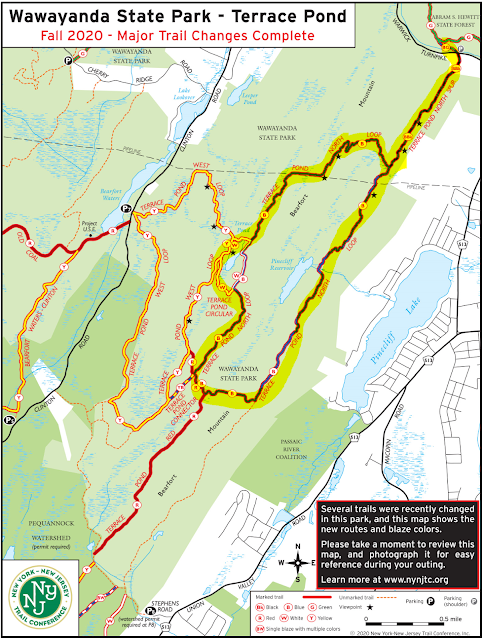Clothing and Footwear
Hiking in our area is a relatively simple experience. We do not have to worry about major elevation changes where weather can be vastly different at the start of a hike compared to the beginning of one, and we can more often than not use common sense as a guide to clothing.
Your best bet is to wear pants whenever possible, mostly to avoid tics and bug bites. But warm days may lead to shorts and that is fine too. If chilly, always dress in layers so you can shed clothing as you go along. Hiking certainly works up a sweat and raises one's body temperature, so top layers should be easily removed and stored.
Footwear is important as well. Of course, boots are the best option and recommended, but sneakers work too. If you plan on hiking often, true hiking footwear is worth their weight in gold. Avoid open toed shoes at all costs and be sure whatever you bring is properly broken in.
Cold Weather Hiking
Please understand we’re not hiking in dangerous winter conditions where proper clothing can be a matter of life and death. These tips are mainly for comfort and enjoyment of your time outside in cold weather.
Your best bet is to wear pants whenever possible, mostly to avoid tics and bug bites. But warm days may lead to shorts and that is fine too. If chilly, always dress in layers so you can shed clothing as you go along. Hiking certainly works up a sweat and raises one's body temperature, so top layers should be easily removed and stored.
Footwear is important as well. Of course, boots are the best option and recommended, but sneakers work too. If you plan on hiking often, true hiking footwear is worth their weight in gold. Avoid open toed shoes at all costs and be sure whatever you bring is properly broken in.
Cold Weather Hiking
Please understand we’re not hiking in dangerous winter conditions where proper clothing can be a matter of life and death. These tips are mainly for comfort and enjoyment of your time outside in cold weather.
- Dress in layers. Hiking in our area usually includes hills which means you’ll sweat and get hot on the way up them, and be chilly with less exertion on the way down or on flat terrain. Layered options is a hikers best friend.
- At the risk of overthinking this, the general rule of thumb is a moisture wicking base layer, an insulating mid layer, and some type of wind resistant top layer. But use common sense too, 40 degree cold weather is much more forgiving than 25 degree cold weather.
- Always bring a hat and gloves, you can easily store in your pack if you end up not needing them.
- Boots become more important the colder it gets, nothing is worse that cold feet for hours at a time!


Comments
Post a Comment